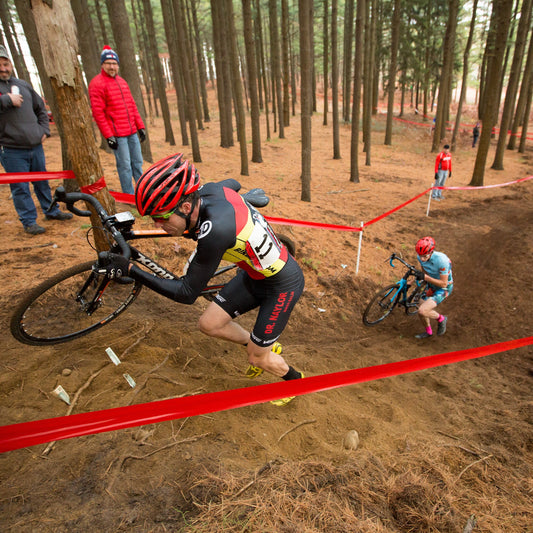When I first entered the world of triathlon almost two decades ago, I followed the path of so many - I dove in head first, not knowing what I was taking on. My first race was an Olympic Distance, followed quickly by a Half Ironman Distance, and then by an Ironman distance. Although an athlete growing up, more than 10 years had passed since my high school glory days, and to say that I lived a sedentary lifestyle was an under-estimation. I was an attorney in New York City and all what I did was work. But as I approached 30, I became tired of being stressed and unfit, so in January of 2000 I hopped on the treadmill and did a two mile run. It nearly killed me. But 18 months from that first run, I raced at the 2001 Ironman Lake Placid. It was an amazing experience, and to this day, one of my greatest athletic accomplishments. But I haven't raced an Ironman distance event since. The process took a toll on me. At the time, I was working 80 hour weeks. I would wake up before work and do a short session, and then go to work for the day. My "evening" break would send me to the gym to run on on the treadmill (I became part of the gym tour) or do a spin class and then back to work until into the night before crashing to begin it all over again the next day. For six months, I did nothing other than work and train. Somewhere in the process of the constant push, I also experienced a severe running injury, which kept me from running for the three months leading up to Ironman. But I was determined to race, and race I did. As you might imagine, the run was less than stellar and I cried several times that day. There are parts of the day that I don't remember - like my whole family cheering for me as I finished the second loop of the bike course. After the race, rather than celebrate, I was in the medical tent and then the hospital for dehydration. That was the last triathlon I did until 2009 when, after racing my bike for several years, I decided that I was ready to re-enter the sport.
When I came back in 2009, I still had in my mind that long course racing was my strength, but appreciated that I could not invest the time to train properly for an Ironman, and so I settled in on the 70.3 distance. It was a good choice - with my schedule, I could train enough to be competitive without it completely taking over my life. For the next couple of years, I focused on the 70.3 distance, but mixed in shorter course racing, more as race preparation for the 70.3 than anything else. Then life changed, again. I retired from the practice of law, and now owned my own fitness and coaching business and my son was born. I knew that I just didn't have the time to train the way I needed to race long course but I wanted to do something. I am admittedly a competitive person, and I decided that I would rather race well than race long. So I opted to train for sprint distance races. And through this, I discovered that sprint distance races are FREAKING AWESOME!
Let's face it, most of us do not have endless time and energy. We have a job to do, a family to support and various other life commitments. Plus, every now and then, we need to sleep. We don't have the time to train 25 hours a week. On 10 hours a week, you could train for an Ironman distance event, but you likely would not have the race experience that you could have if you had more time to devote. But on less time, you could have a kick a** performance at a sprint triathlon and still have fun both getting there and racing.
Here are five reasons why I think the Sprint Distance is so awesome:
1. It's a great way to enter the sport. At 0.45 mile swim, 12.4 mile bike and 3.1 mile run, it feels accessible to most. At the same time, it's a great accomplishment to complete. Dedicate 5 hours a week for a two to three months, and you can get to the start line of a local race and finish with a smile on your face. A couple swims, bikes and runs each week will get you there. And you'll still have time for all of your other commitments.
2. It's also a great way to see how hard you can push. The sprint distance is short enough that you can literally red-line the whole event. If you want to test your limits and see how fast you can be, this is a great option. Rather than endless long and slow runs and day long solitary bike rides, you can hit the track for speed work, or go out with friends on the bike and mix in some sprints.
3. You can make it a family event. Sprint distance races are generally open to individuals as young as 15. Grab your spouse and your older kids and train and race together. Maybe make a friendly competition out of it. There are also options to pull together a relay team, and maybe race against another family. If your kids aren't old enough to race, they can come and cheer you on. They will see you at least a few times in the course of a couple hours and you can often grab them to cross the finish line with you. My finishing medals are just as important to my son as they are to me.
4. You can race at the USA Triathlon National Championships. Triathlon is unique in that it offers national level competition for amateurs. I first raced at Nationals in 2011 and have gone back several times since then. Every year, I find the experience amazing - it never gets old to run through the finishing straight to the cheers of the crowd. Nationals has grown over the years, with a couple thousand athletes participating in the Sprint distance. Unlike the Olympic distance, you do not need to qualify for the Sprint distance. Just register and have the same Nationals experience.
5. You can represent Team USA. I honestly never thought that I would have the opportunity to represent my country. I spent my theoretically competitive years working way too many hours and sport was about as far from my mind as it could be. But in my mid 40s, there I was, lined up at the Age Group World Championships in Edmonton, Canada. In my age group was none other than Michellie Jones, the Silver Medalist from 2000 Olympics. Ok - how cool is that! An attorney turned triathlete and coach had the opportunity to be on the start line with a former Olympian. That was a very special experience for me, and I have raced for Team USA on two more occasions.
Although my triathlon journey began with the quest to Ironman, it was only when I embraced the sprint distance that I really found my potential as an athlete. And, I did that without giving up the rest of my life! Come on, give it a try!
This post was written by Coach, Reem Jishi.






